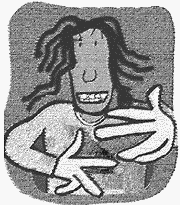The first thing you should know is that “Scott-Heron” is his last name. Gil. Scott-Heron. OK? It’s not Gil-Scott Heron. Now that we’ve gotten that out of the way, Gil Scott-Heron writes poetry with a purpose, and that purpose has little to do with obscure symbolism and arcane metaphors. Gil writes poetry to educate and inspire, not to impress. As he once observed, “Why would you need a poet to make things more complex? Two winos can make things more complex.”
Gil Scott-Heron
Showbox, Saturday, July 31
Over the last three decades, this poet, composer, singer, and pianist has crafted a body of work that has been consistently strong, beautiful, spiritual, and challenging, stressing the human warmth that can be gathered from revolutionary fire. He is a living bridge between the Harlem Renaissance and hip-hop, a political pundit of the first order, and a scholar of bluesology (“the science of how things feel”). In short, Scott-Heron’s music is as deep as his voice, which is pretty damn deep.
Emerging from New York’s “Black Arts” scene in the late 1960s with two novels and an album of poetry, Scott-Heron first gained wide acclaim with his song-poem “The Revolution Will Not Be Televised.” These days, many folks—and lazy journalists looking for a cute lead in particular—take the title at face value and declare this sentiment outdated. They apparently have never listened to the song, which critiques the media’s tendency to co-opt revolutionary impulses. “The revolution,” as Scott-Heron points out, “will not kill germs that may cause bad breath.” Anyone who feels that Scott-Heron is no longer relevant would do well to note the current 7UP ad campaign in which soft drink consumption is presented as the uniting force for a cadre of rebellious young “Uns.”
Listen to the song again, chump.
As the ’70s wore on, Scott-Heron matured into a soul-jazz powerhouse, blending personal and social insights into a warm sensibility that reflected the country’s mood in the post-Watergate era. Unlike many songwriters of the time, an increasingly personal outlook did not mean the abandonment of critical thought about the world we live in. In songs like “Winter in America” and “Johannesburg,” for instance, he addressed apartheid in both America and South Africa. Since the early ’80s, he has kept a somewhat lower recording profile. His last album of new material, Spirits, was released five years ago to little fanfare. But like many artists of his era, Scott-Heron has been playing live straight through and has undergone something of a resurgence of late. Last year, TVT rereleased three of his classic ’70s records (all made with collaborator Brian Jackson).
So what can you expect from Scott-Heron’s show? According to extensive anecdotal evidence, not a single person has ever left a Gil Scott-Heron concert disappointed. He will take the stage looking older and perhaps thinner than you expected, and you may begin to have second thoughts. Then he will speak, and all concerns will melt away. He will present a rich gumbo of soul-wrenching songcraft, observational humor, political insight, and all-out electric funky jazz. Suddenly it will be several hours later, and you will be walking out into the street feeling better than you have in a long time, like maybe you really will be able to do all those things you’ve been meaning to do—write that book, protest that injustice—and you will have a poet to thank for it. It may be midnight, but that only means that it’s the first minute of a new day.





